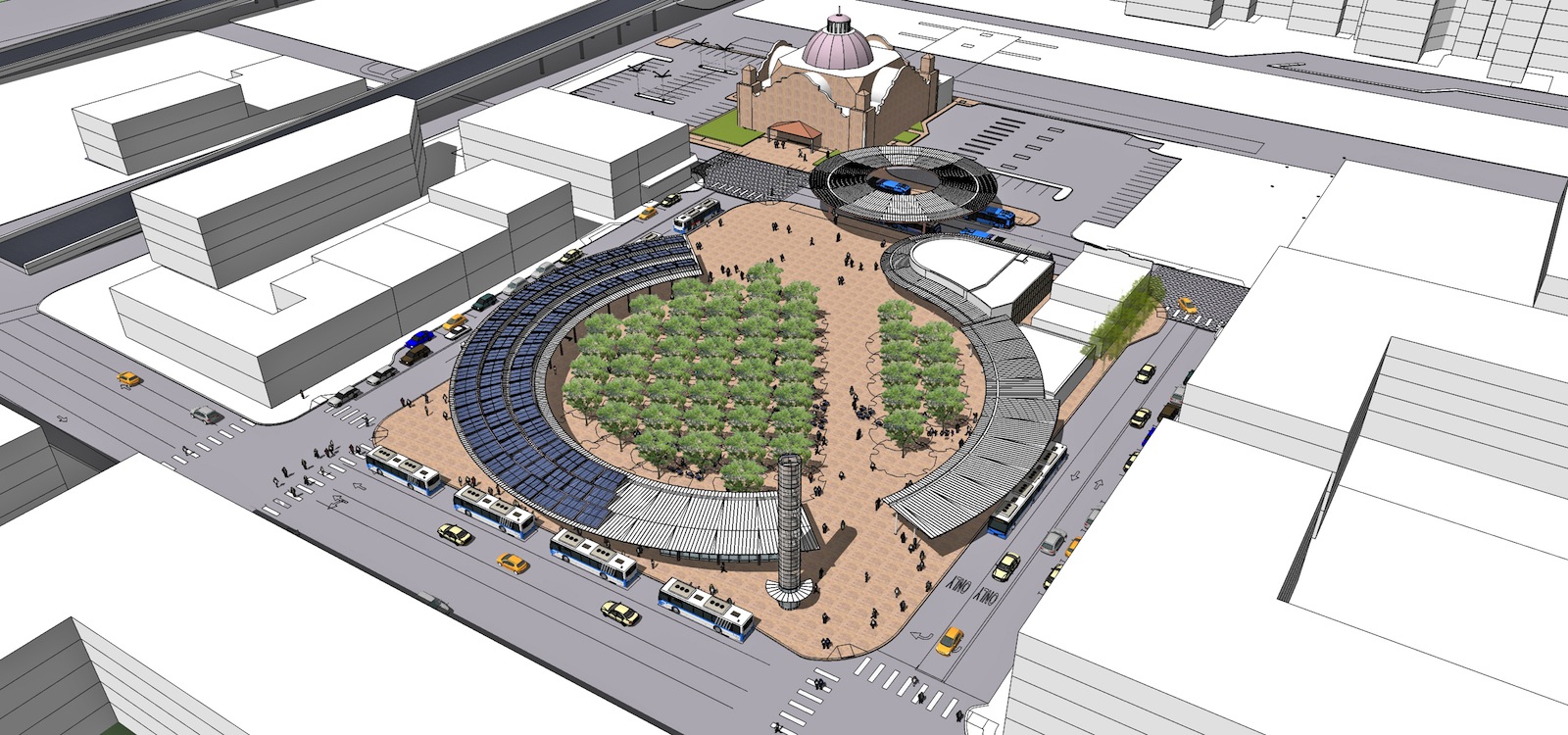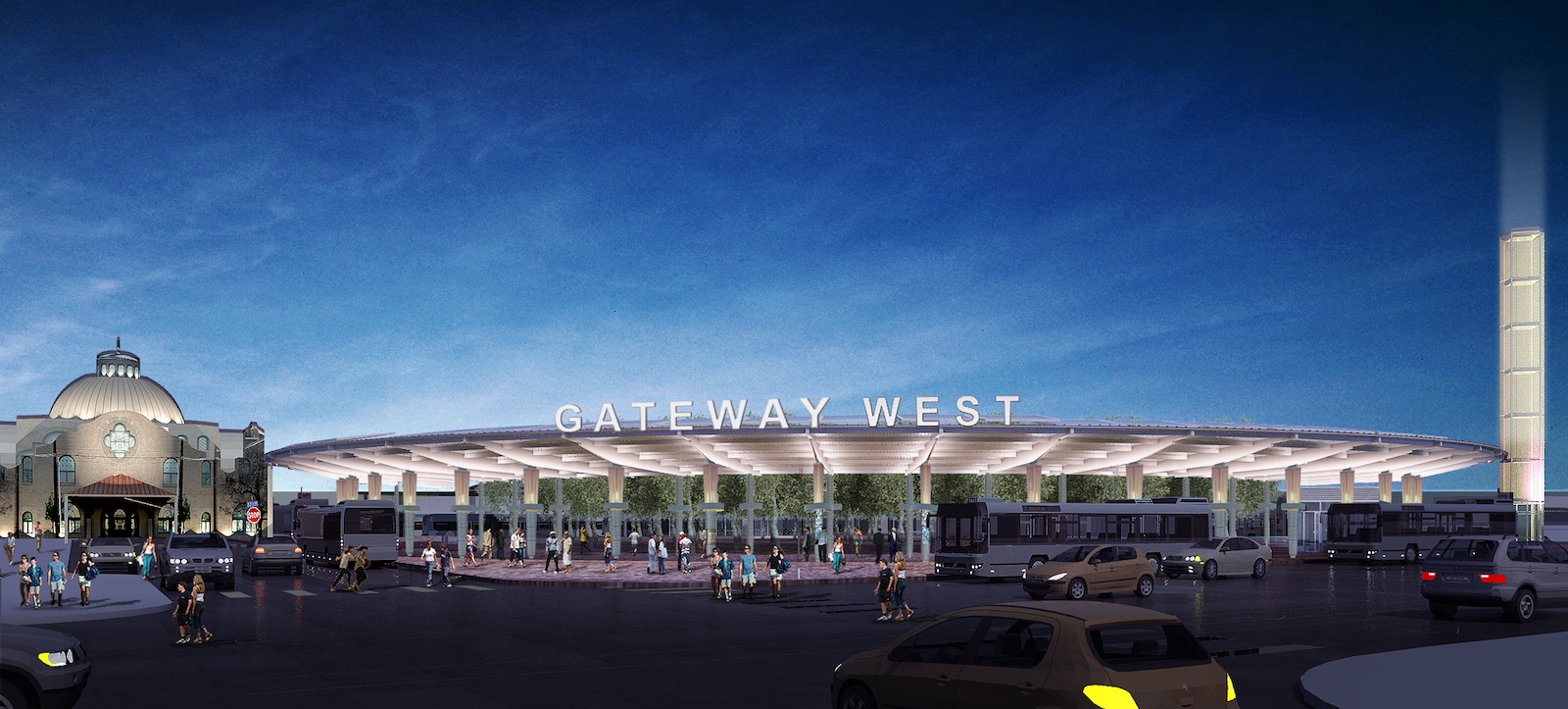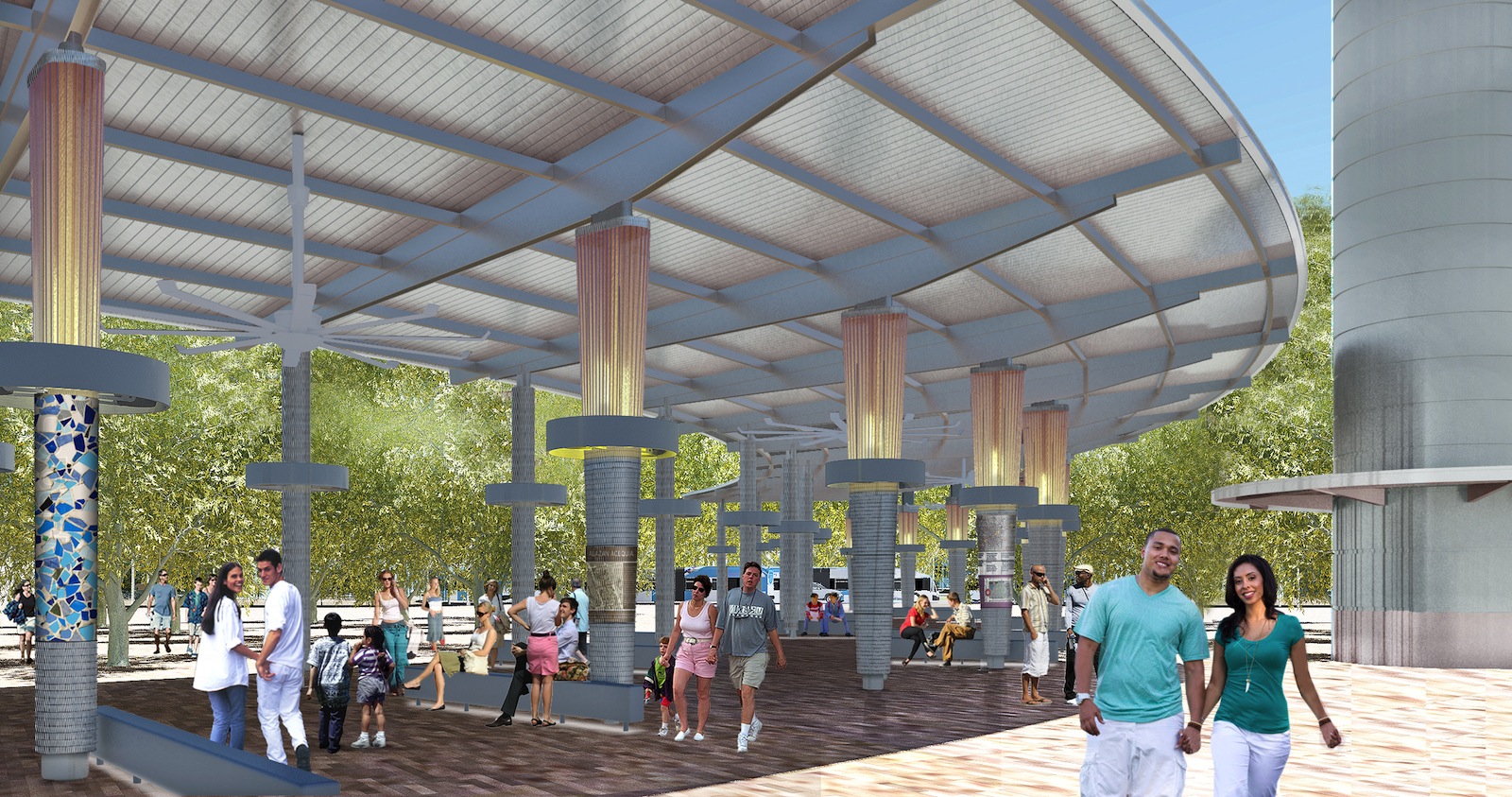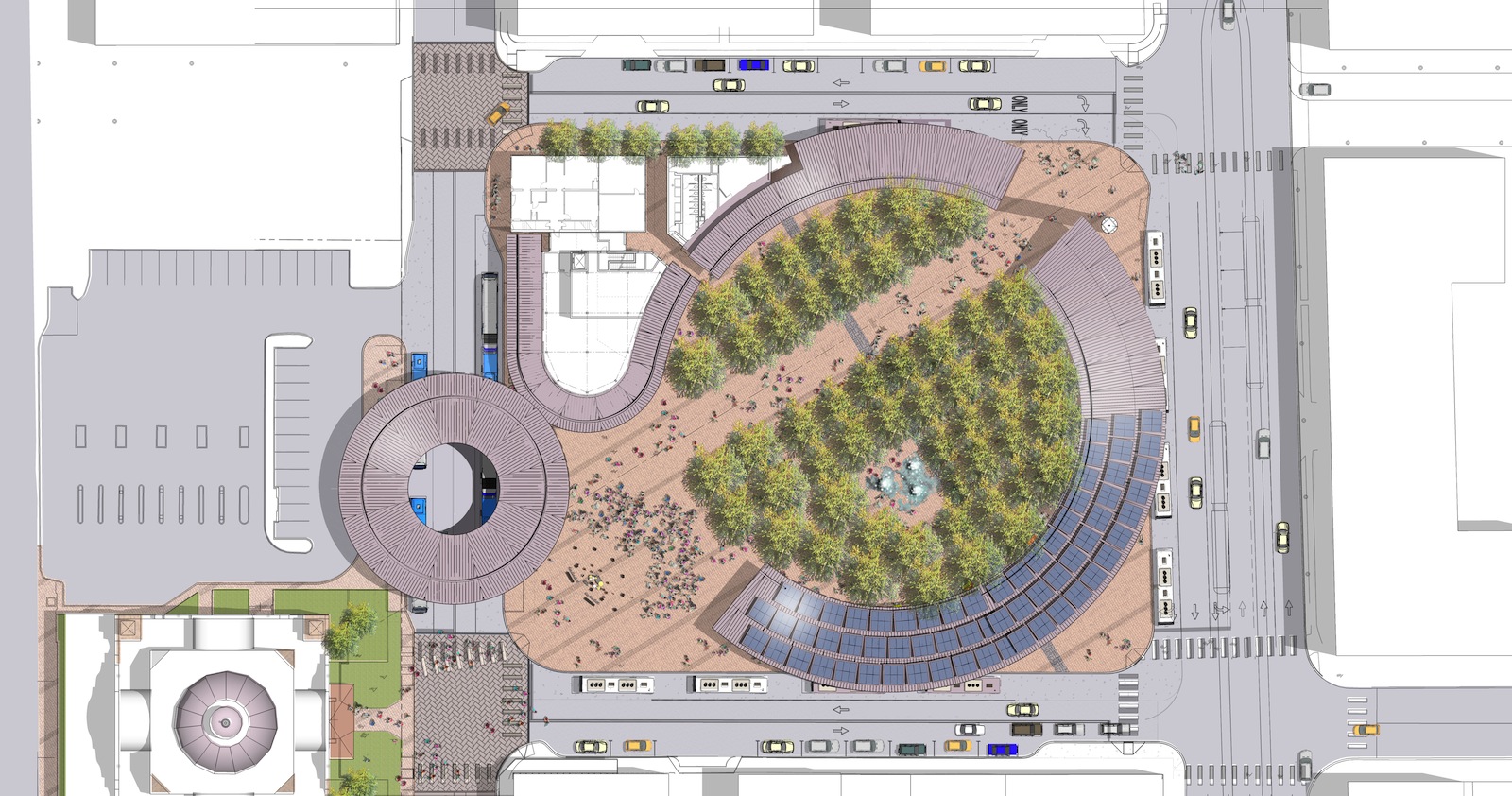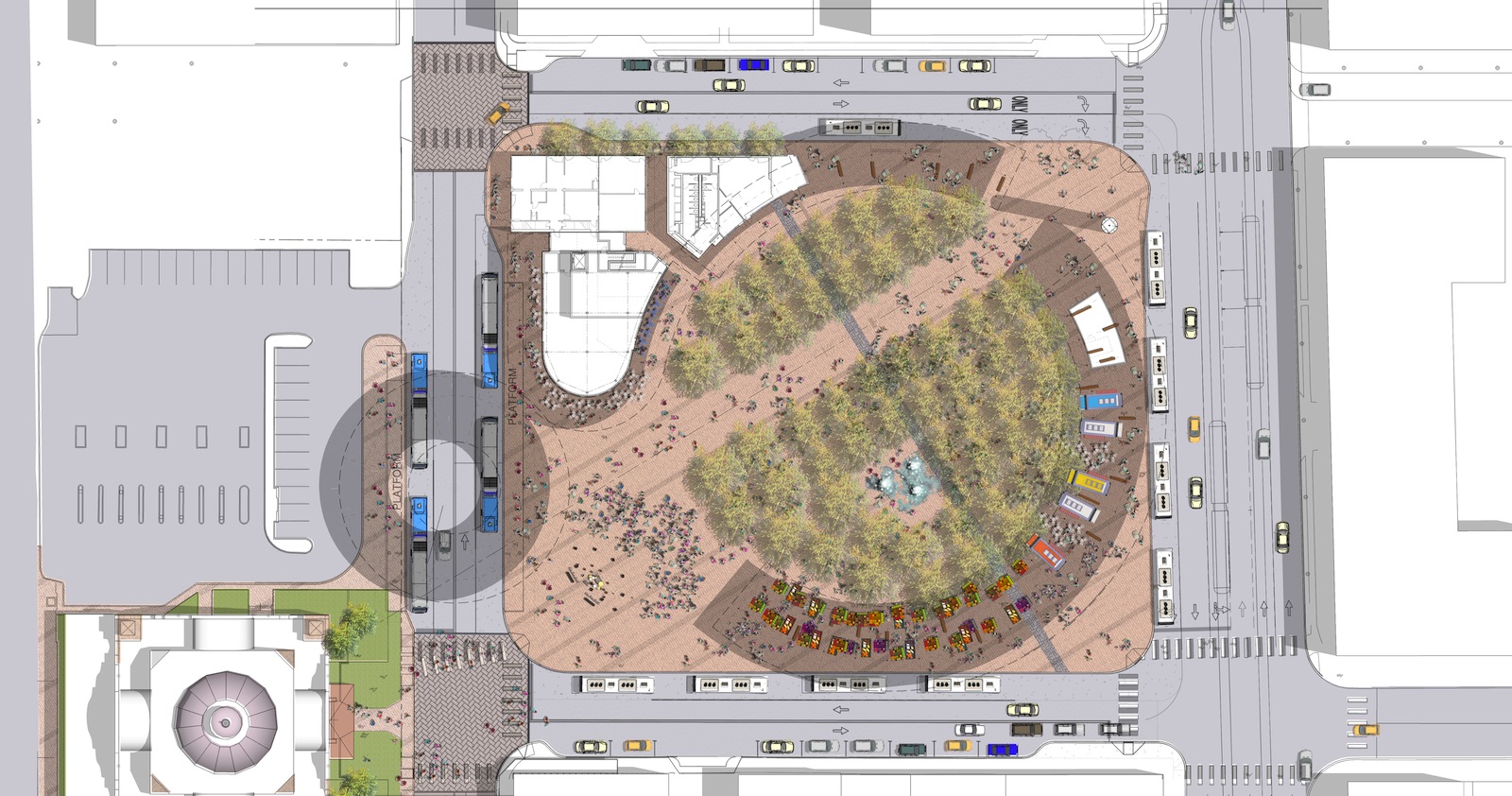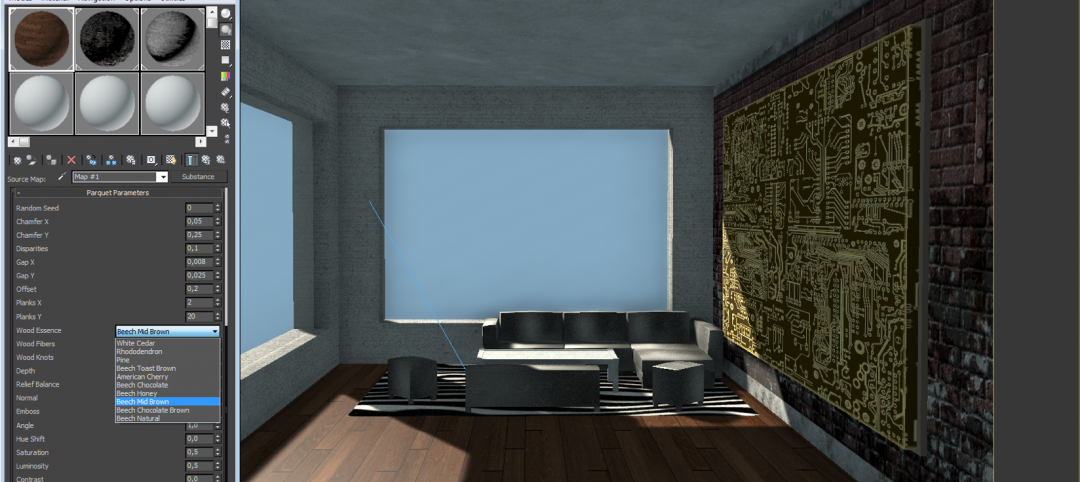Last week, the Board of Directors of VIA Metropolitan Transit in San Antonio, Texas, officially approved plans previously presented by the architecture design team from EE&K a Perkins Eastman company to construct Phase 2 of the Westside Multimodal Transit Center. This construction award comes mere weeks before the groundbreaking, which is scheduled for July.
The new 90,000-sf development will principally service San Antonio’s growing network of city bus and VIA PRIMO bus rapid transit service, including real-time arrival updates, as well as become an iconic public plaza for the city. The design team is led by Principal Stan Eckstut FAIA and Associate Principal Jonathan Cohn AIA, LEED AP.
The public plaza, comprising a full city block, will be encircled by a varied metal and glass Grand Canopy, approximately 50% of which is covered by a photovoltaic panel array that will generate a large portion of the electricity required to light the facility. The plaza’s expansive interior will feature a significant stand of cedar elm trees, while a permeable ground surface and underground detention systems will control stormwater runoff.
The EE&K a Perkins Eastman company team includes local architects Ford, Powell & Carson Inc., led by Principal Jay Louden AIA and Senior Associate Michael Guarino, and landscape architect Lawrence C. Clark ASLA, Vice President of Bender Wells Clark Design.
“This will be the next great place for San Antonio, and not just for transit riders” says Eckstut. “First and foremost, the plan for Westside Multimodal accommodates the site’s various transit elements, but the space is designed to draw people in for food, entertainment and leisure. We have designed a public square that will encourage future private investments and continue to revitalize the city’s Westside District.”
The design vision for Westside Multimodal Transit Center balances mass transit with open green space, mixed-use development, public art, educational signage, and a host of sustainable design features. The Center’s main entranceway will be located at the corner of Frio and Houston Streets, and clearly identifiable from long distances thanks to the planned “Light Tower” installation, designed by local San Antonio artist Bill Fitzgibbons.
The site is adjacent to the historic and newly renovated I&GN Station, which served as inspiration for the final design. The new facility will also further expand B-Cycle, the city’s bike share system, and plans are in the works for the Transit Center to accommodate future rail service as well.
Related Stories
| Dec 13, 2010
Energy efficiency No. 1 priority for commercial office tenants
Green building initiatives are a key influencer when tenants decide to sign a commercial real estate lease, according to a survey by GE Capital Real Estate. The survey, which was conducted over the past year and included more than 2,220 office tenants in the U.S., Canada, France, Germany, Sweden, the UK, Spain, and Japan, shows that energy efficiency remains the No. 1 priority in most countries. Also ranking near the top: waste reduction programs and indoor air.
| Dec 7, 2010
Are green building RFPs more important than contracts?
The Request for Proposal (RFP) process is key to managing a successful LEED project, according to Green Building Law Update. While most people think a contract is the key element to a successful construction project, successfully managing a LEED project requires a clear RFP that addresses many of the problems that can lead to litigation.
| Dec 7, 2010
Blue is the future of green design
Blue design creates places that are not just neutral, but actually add back to the world and is the future of sustainable design and architecture, according to an interview with Paul Eagle, managing director of Perkins+Will, New York; and Janice Barnes, principal at the firm and global discipline leader for planning and strategies.
| Dec 7, 2010
Green building thrives in shaky economy
Green building’s momentum hasn’t been stopped by the economic recession and will keep speeding through the recovery, while at the same time building owners are looking to go green more for economic reasons than environmental ones. Green building has grown 50% in the past two years; total construction starts have shrunk 26% over the same time period, according to “Green Outlook 2011” report. The green-building sector is expected to nearly triple by 2015, representing as much as $145 billion in new construction activity.
| Dec 7, 2010
USGBC: Wood-certification benchmarks fail to pass
The proposed Forest Certification Benchmark to determine when wood-certification groups would have their certification qualify for points in the LEED rating systemdid not pass the USGBC member ballot. As a result, the Certified Wood credit in LEED will remain as it is currently written. To date, only wood certified by the Forest Stewardship Council qualifies for a point in the LEED, while other organizations, such as the Sustainable Forestry Initiative, the Canadian Standards Association, and the American Tree Farm System, are excluded.
| Dec 7, 2010
Prospects for multifamily sector improve greatly
The multifamily sector is showing signs of a real recovery, with nearly 22,000 new apartment units delivered to the market. Net absorption in the third quarter surged by 94,000 units, dropping the national vacancy rate from 7.8% to 7.1%, one of the largest quarterly drops on record, and rents increased for the second quarter in a row.
| Dec 7, 2010
Hot rumor: Norman Foster designing Apple’s new campus
Lord Norman Foster, reportedly has been selected to design Apple’s new campus in Cupertino, Calif. If the news is true, Foster is a good match for Apple say experts. Foster built his celebrity by marrying big gestures to technological wizardry. And, unlike some starchitects, he has glommed onto the environmental revolution—something Apple has made a point of embracing, too.
| Dec 7, 2010
10 megacities of the near future
With Beijing, Shanghai, and Mumbai already on the global radar, where can the next wave of construction be found? Far beyond China, India, and even Brazil it’s predicted. The world’s next future megacities could include Istanbul, Turkey; Ho Chi Minh City, Vietnam; and Khartoum, Sudan, among others. Read about these emerging and little-known behemoths.


